Trees and bushes are toppling onto the beach and dying because the dunes are collapsing on the bay side of the Townsends Inlet Bridge.
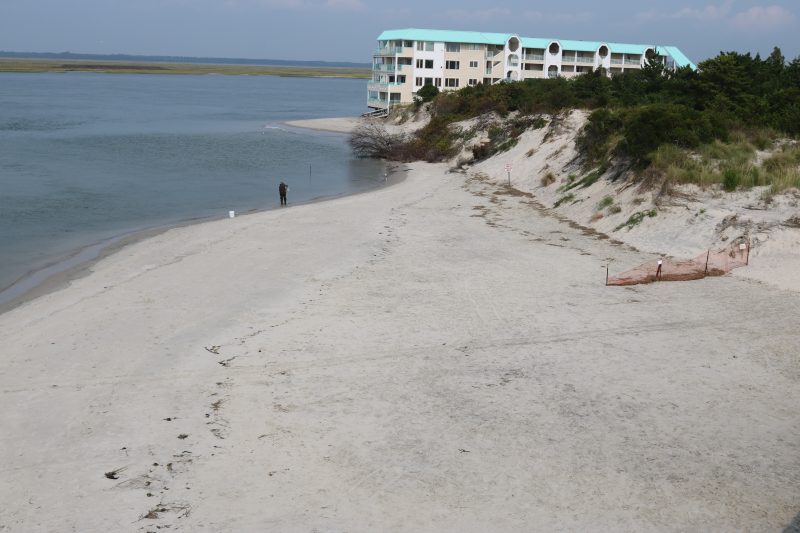 By DONALD WITTKOWSKI
Mother Nature, it seems, is working in reverse in Townsends Inlet, the powerful and deep channel that separates Sea Isle City and Avalon.
In April, much of the top layer of powdery sand that once covered the beach on the bay side of the Townsends Inlet Bridge in Sea Isle was swept away into the channel, exposing thousands of clam shells hidden underneath.
The remnants of the beach, in turn, formed a gigantic sandbar that extended far into the inlet. Using the sandbar, beachgoers were able to walk out nearly as far as the middle of the bridge, where the swift waters of the inlet usually flow.
Yet now, the opposite has happened just five months later.
The thick sand is back on the beach where it should be. Moreover, the massive sandbar that had once formed a makeshift peninsula in the channel is disappearing.
By DONALD WITTKOWSKI
Mother Nature, it seems, is working in reverse in Townsends Inlet, the powerful and deep channel that separates Sea Isle City and Avalon.
In April, much of the top layer of powdery sand that once covered the beach on the bay side of the Townsends Inlet Bridge in Sea Isle was swept away into the channel, exposing thousands of clam shells hidden underneath.
The remnants of the beach, in turn, formed a gigantic sandbar that extended far into the inlet. Using the sandbar, beachgoers were able to walk out nearly as far as the middle of the bridge, where the swift waters of the inlet usually flow.
Yet now, the opposite has happened just five months later.
The thick sand is back on the beach where it should be. Moreover, the massive sandbar that had once formed a makeshift peninsula in the channel is disappearing.
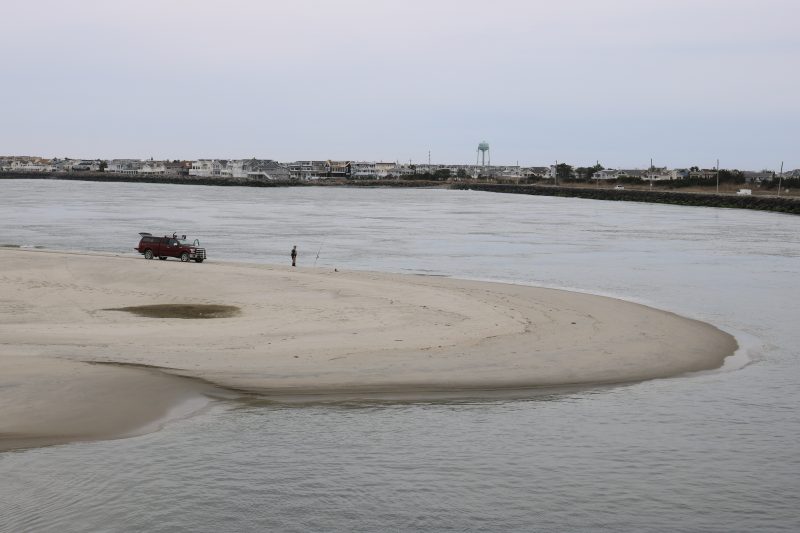 A giant sandbar jutting far into the inlet, seen here in April, is disappearing now.
This is not the first time that the beach on the Sea Isle side of the bridge has been radically altered by Townsends Inlet. In the summer of 2020, a large section of the beach south of 94th Street collapsed like a mini avalanche and was gobbled up by the water.
The phenomenon was captured on video that went viral after it was posted on YouTube, Facebook and other social media platforms.
Just like with the big sandbar, the collapsed beach was blamed on the inlet’s powerful waters.
Lewis Donofrio, chief engineer for the Cape May County Bridge Commission, the agency that operates the Townsends Inlet Bridge, said the inlet’s deep and rapidly flowing water creates a whirlpool effect that causes changes to the surrounding beach.
Donofrio explained that the beach’s transformation is a natural process where “the sand goes away and comes back.”
A giant sandbar jutting far into the inlet, seen here in April, is disappearing now.
This is not the first time that the beach on the Sea Isle side of the bridge has been radically altered by Townsends Inlet. In the summer of 2020, a large section of the beach south of 94th Street collapsed like a mini avalanche and was gobbled up by the water.
The phenomenon was captured on video that went viral after it was posted on YouTube, Facebook and other social media platforms.
Just like with the big sandbar, the collapsed beach was blamed on the inlet’s powerful waters.
Lewis Donofrio, chief engineer for the Cape May County Bridge Commission, the agency that operates the Townsends Inlet Bridge, said the inlet’s deep and rapidly flowing water creates a whirlpool effect that causes changes to the surrounding beach.
Donofrio explained that the beach’s transformation is a natural process where “the sand goes away and comes back.”
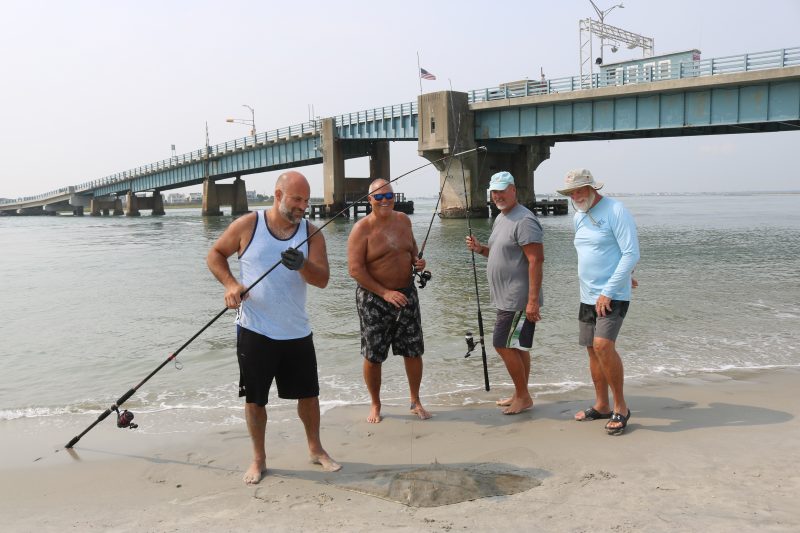
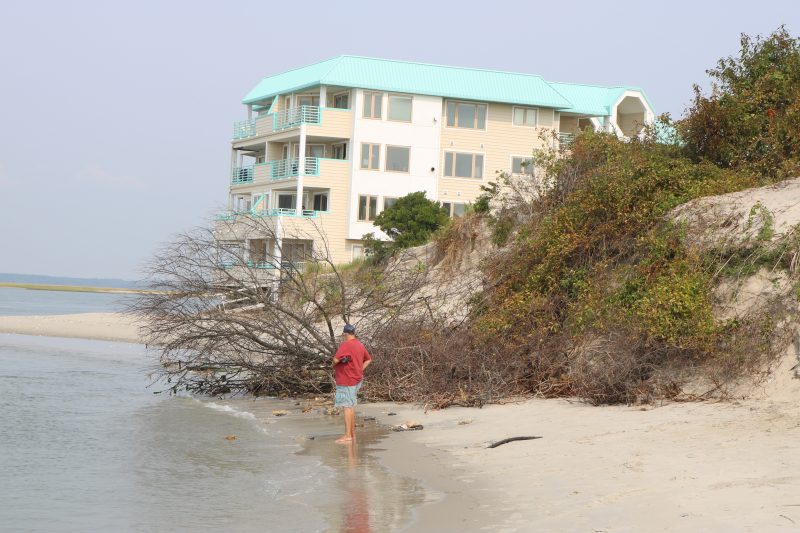 Trees and bushes are toppling onto the beach and dying because the dunes are collapsing on the bay side of the Townsends Inlet Bridge.
However, mature trees and bushes that live on top of the dunes overlooking the inlet have been taking a beating from dramatic erosion that began in the spring. As the dunes have collapsed, some of the trees have toppled over onto the beach below.
The mountainous dunes have been sheared off to create cliff-like drop-offs that appear to be 20 or 30 feet high in some places.
Sea Isle officials are trying to develop both a short-term and longer-range strategy to protect the beach and dunes from severe erosion.
City Business Administrator George Savastano walked the beach in Townsends Inlet on Tuesday to take a look at the erosion.
“There’s a lot going on with the inlet,” he said of the dynamic changes that have occurred in the past few months.
One idea city officials are considering in the short term is something known as “sand harvesting.” Savastano explained that sand could be harvested, or scraped, from healthier beaches nearby and used to patch up a section of the eroded dunes and beach in Townsends Inlet.
Trees and bushes that have collapsed onto the beach and since died would be removed to clear out the blight.
Trees and bushes are toppling onto the beach and dying because the dunes are collapsing on the bay side of the Townsends Inlet Bridge.
However, mature trees and bushes that live on top of the dunes overlooking the inlet have been taking a beating from dramatic erosion that began in the spring. As the dunes have collapsed, some of the trees have toppled over onto the beach below.
The mountainous dunes have been sheared off to create cliff-like drop-offs that appear to be 20 or 30 feet high in some places.
Sea Isle officials are trying to develop both a short-term and longer-range strategy to protect the beach and dunes from severe erosion.
City Business Administrator George Savastano walked the beach in Townsends Inlet on Tuesday to take a look at the erosion.
“There’s a lot going on with the inlet,” he said of the dynamic changes that have occurred in the past few months.
One idea city officials are considering in the short term is something known as “sand harvesting.” Savastano explained that sand could be harvested, or scraped, from healthier beaches nearby and used to patch up a section of the eroded dunes and beach in Townsends Inlet.
Trees and bushes that have collapsed onto the beach and since died would be removed to clear out the blight.
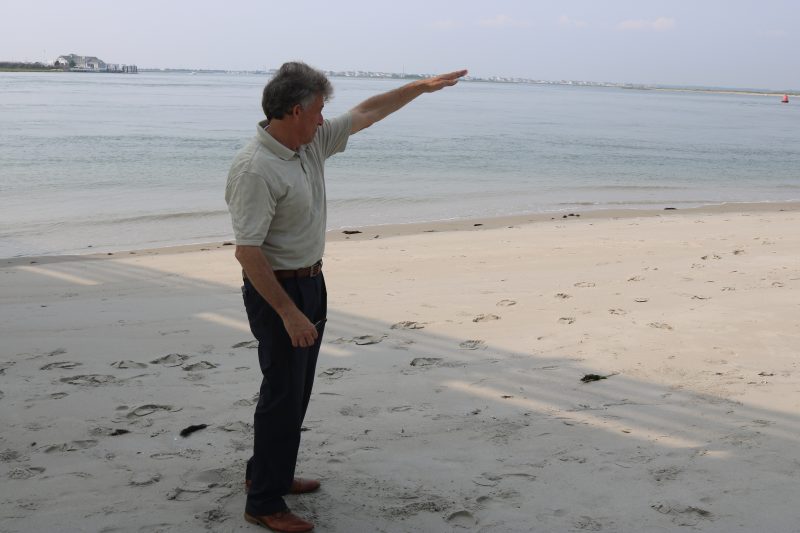 City Business Administrator George Savastano takes a look down the beach at Townsends Inlet.
In the longer term, a more extensive replenishment of the beaches and dunes in Townsends Inlet may be needed. Savastano estimated that it would take about 50,000 cubic yards of fresh sand to complete the job.
“We would be protecting what we have so we don’t lose a lot more,” he said of rebuilding the existing dunes and beach.
Last summer, Sea Isle’s beaches were widened and replenished with more than 750,000 cubic yards of new sand between 28th and 52nd streets in the midsection of town and from 74th to 93rd streets in Townsends Inlet at the southern tip of the island.
The large-scale replenishment project was supervised and funded mostly by the U.S. Army Corps of Engineers, a federal agency.
The Army Corps replenished the beaches on the ocean side of the Townsends Inlet Bridge. However, the eroded beaches and dunes on the bay side of the bridge were outside the boundaries of the project.
In an interview last week, a spokesman for the Army Corps said the agency has no plans to change the scope of its project to replenish the beach on the bay side of the bridge.
What the Army Corps will do is to share technical data that it gleans from its ongoing surveys of Sea Isle’s shoreline to help the city devise a strategy to protect the beaches and dunes on the bay side, the spokesman said.
City Business Administrator George Savastano takes a look down the beach at Townsends Inlet.
In the longer term, a more extensive replenishment of the beaches and dunes in Townsends Inlet may be needed. Savastano estimated that it would take about 50,000 cubic yards of fresh sand to complete the job.
“We would be protecting what we have so we don’t lose a lot more,” he said of rebuilding the existing dunes and beach.
Last summer, Sea Isle’s beaches were widened and replenished with more than 750,000 cubic yards of new sand between 28th and 52nd streets in the midsection of town and from 74th to 93rd streets in Townsends Inlet at the southern tip of the island.
The large-scale replenishment project was supervised and funded mostly by the U.S. Army Corps of Engineers, a federal agency.
The Army Corps replenished the beaches on the ocean side of the Townsends Inlet Bridge. However, the eroded beaches and dunes on the bay side of the bridge were outside the boundaries of the project.
In an interview last week, a spokesman for the Army Corps said the agency has no plans to change the scope of its project to replenish the beach on the bay side of the bridge.
What the Army Corps will do is to share technical data that it gleans from its ongoing surveys of Sea Isle’s shoreline to help the city devise a strategy to protect the beaches and dunes on the bay side, the spokesman said.
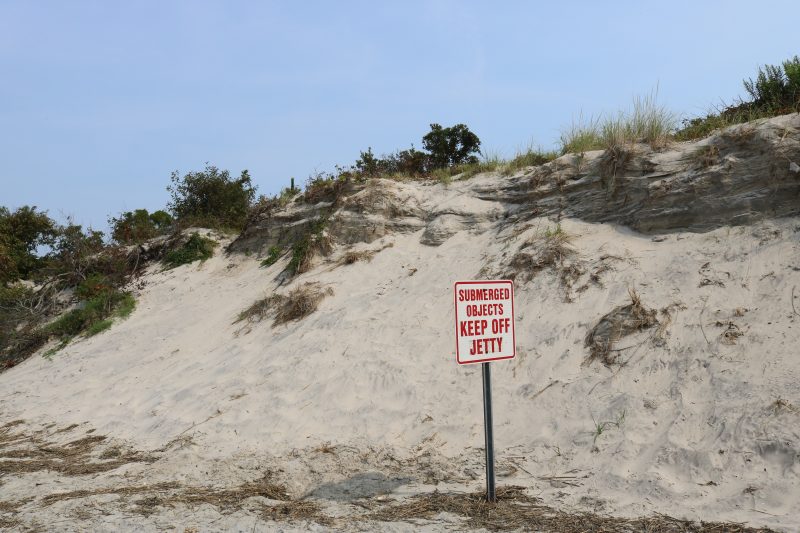 Cliffs as high as 20 or 30 feet are forming where the dunes have collapsed.
Cliffs as high as 20 or 30 feet are forming where the dunes have collapsed.